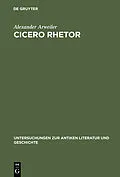This fundamentally new interpretation of the Partitiones oratoriae shows the small dialogue to be a demanding compendium of the whole system of rhetorical doctrine and places it at the centre of a specifically Ciceronian concept of rhetoric. By drawing upon Cicero's other philosophical and rhetorical works, the author reveals the political relevance: Cicero's learned writings present criteria for the selection of suitable politicians, to whom powers of decision-making should only be given after they have proved themselves to have studied and to possess methodical abilities. Thus Cicero's work as a writer after his exile cannot sensibly be separated from his political activity.
Autorentext
Alexander Arweiler lehrt als Privatdozent am Institut für Klassische Altertumskunde der Christian-Albrechts-Universität zu Kiel.
Klappentext
This fundamentally new interpretation of the Partitiones oratoriae shows the small dialogue to be a demanding compendium of the whole system of rhetorical doctrine and places it at the centre of a specifically Ciceronian concept of rhetoric. By drawing upon Cicero's other philosophical and rhetorical works, the author reveals the political relevance: Cicero's learned writings present criteria for the selection of suitable politicians, to whom powers of decision-making should only be given after they have proved themselves to have studied and to possess methodical abilities. Thus Cicero's work as a writer after his exile cannot sensibly be separated from his political activity.
